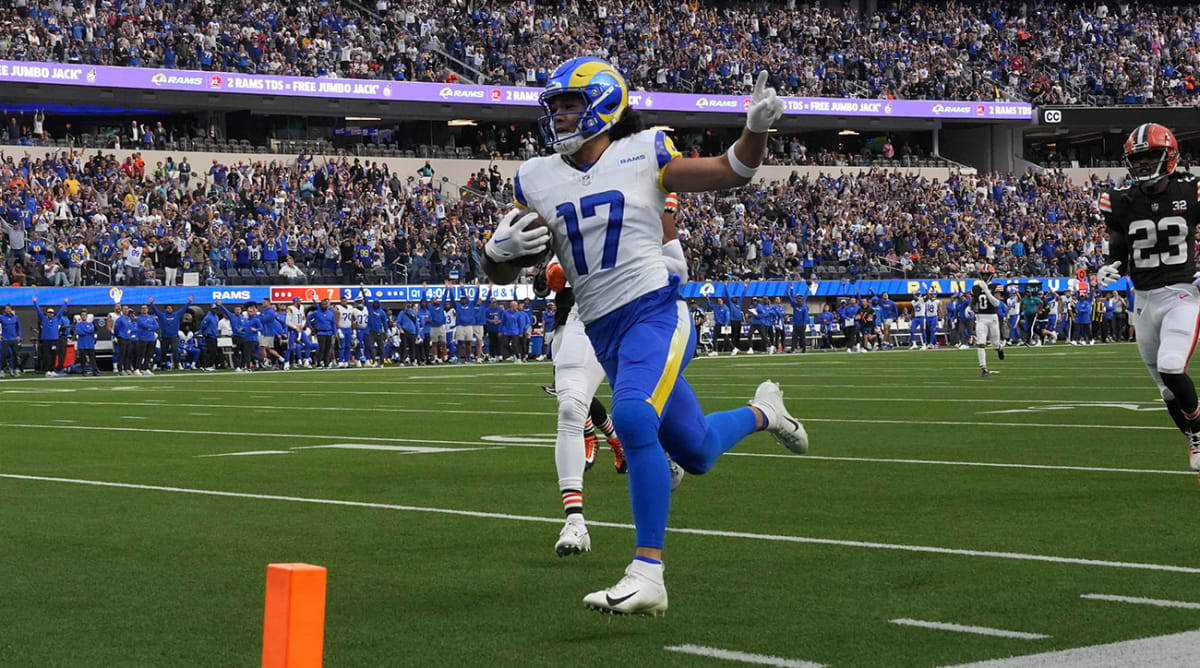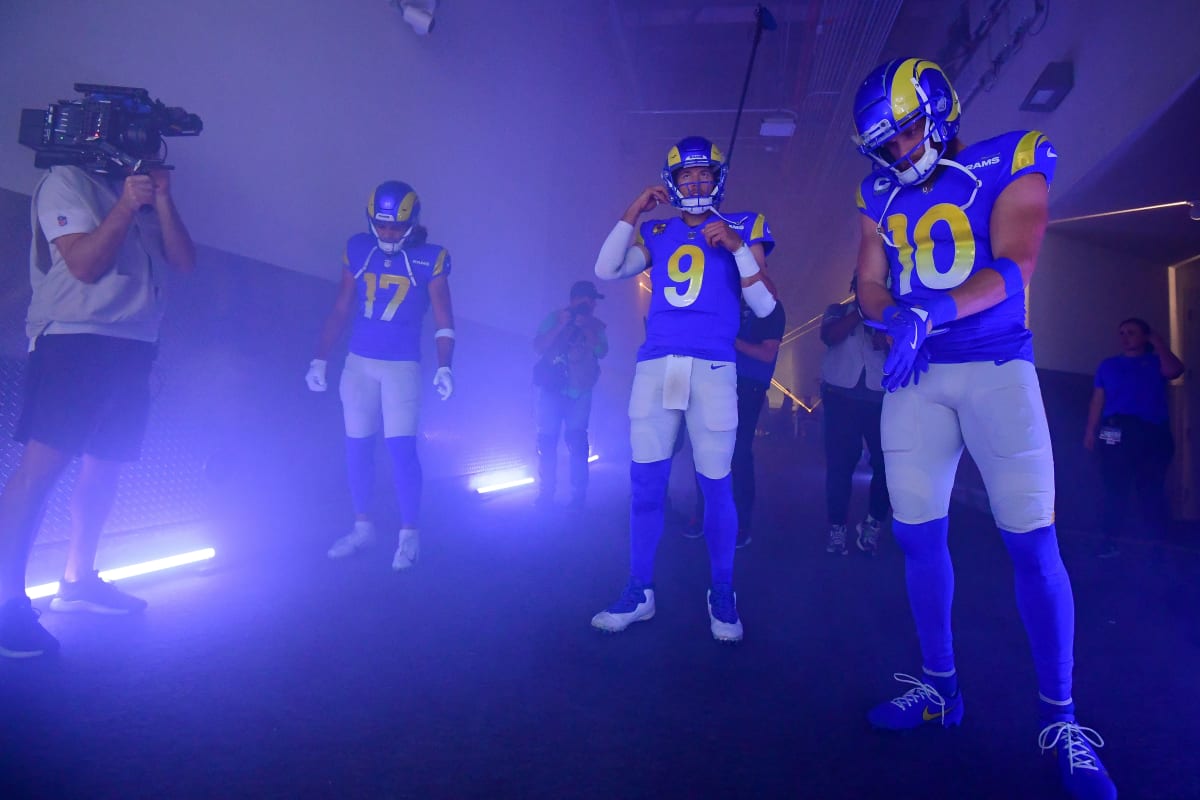Operation Puka 101 began in an office down the hall from Los Angeles Rams coach Sean McVay, and a hard right from the quarterback meeting room that often holds the whiteboard sessions of Matthew Stafford and Cooper Kupp.
Early in the spring, Puka Nacua, now a front-runner for the 2023 Offensive Rookie of the Year award (alongside C.J. Stroud) and the record holder for most receptions and yards for a rookie in NFL history, sent a text to Jake Peetz, the Rams’ passing-game specialist.
“Hey, Coach, can I come in and go over some of these concepts before [our] special teams [meeting]?”
The request was simple: Nacua wanted more time on the field to learn the intricacies of the Rams’ offense. And he wanted to do it right away. In Los Angeles, in Sean McVay’s offense, that meant cramming graduate-level calculus in one spring. Wide receivers especially, who are intricately tied in to Los Angeles’s blocking scheme, are responsible for understanding each of the individual formations, how each backfield motion will be executed—the Rams utilize presnap motion more than any team in the NFL, save for the Miami Dolphins—and how the defensive structure will look both before and after the motion is executed. During that defensive shifting process, a receiver’s blocking target could also change.

Kirby Lee/USA TODAY Sports
For weeks, Peetz never had to wonder whether Nacua would flake on him for sessions that would block an hour of time before the first meetings of the day and usually another hour in the afternoon. Nacua had acted as if he’d enrolled in a class. If Peetz was pulled into a staff meeting that conflicted with their regularly scheduled sessions and wasn’t in his office when Nacua walked by, the receiver would send a quick reminder. Hey, are we still on?
“If you can’t line up and you can’t motion and you can’t understand your targets, it’s going to be really hard to see the field here,” Peetz, who joined the Rams’ staff in 2022 after a handful of stops in the NCAA, including two at Alabama and a year as offensive coordinator at LSU, says. “For Sean to be able to trust you, to put you on the field, you need to know. It’s not that you can’t make mistakes, but you have to understand.
“That created a sense of urgency for me to teach Puka. And Puka responded with a sense of urgency to learn. He kept showing up. I wondered if he would keep showing up early in the morning. I wondered if he’d keep showing up in the afternoon. I wondered if I would have to send him a text. Never once did I have to.”
With the Rams surging into the playoffs, the relationship between Nacua and Peetz provides a small window into why Los Angeles has arrived here, way ahead of expectations. From a staffing standpoint, McVay’s rebooted offensive room has blossomed together. Coaches are comfortable reaching across rooms and sharing expertise. The collaboration between Peetz and McVay’s heralded wide receivers coach, Eric Yarber, is just one example of players being better served and the burden of a complex offense being shared. Schematically, the rapid education of a fifth-round pick has allowed Los Angeles to do the one thing almost no other team in the playoff field can do: throw a three-wide receiver set on the field and have it capably perform the duties of a two-wide receiver and two-tight-end set; or even a one-wide receiver, three-tight-end set.
“When I first got here, Coach [Bill] Belichick called me and said: One of the things that you’re going to learn there that creates problems is how they are in 11-personnel but they’re really playing 12,” Peetz says. “Like Cooper Kupp, he plays like a number-one receiver but he also plays like a number-one tight end. There’s a lot that goes into that.”
While Rams coaches are heavily protective of divulging too much about the scheme, they want to, in essence, change the responsibilities of defensive players at the last minute. They want to alter gap assignments. They want to show the opposing team a photograph, then rip it up right before the snap. I wrote about this in the spring and talked to the team’s middle linebacker, Ernest Jones, in the preseason. He said practicing against it on a daily basis made him feel bad for opponents who don’t see them regularly.
Through that strategy, with receivers tied into the blocking scheme, it creates more openings in the passing game when a defender has to consider whether he is being blocked or having to defend a route. Robert Woods once filled that role in the offense, before he gave way to Cooper Kupp who, by his second fully healthy season, was catching more than 90 passes a year.
For Nacua, thanks to his expedited onboarding process, his targets could come faster and in more significant situations right away.
In Week 2 against the San Francisco 49ers, for example, on both third-and-2 and fourth-and-2 situations in the fourth quarter, trailing a division rival by less than a touchdown, it appeared plays were called specifically for Nacua. Before a third-down incompletion, Stafford looked in his direction before taking the snap. On fourth down, there was action from Tutu Atwell meant to pull a receiver away from Nacua to give him space to break toward the quarterback for an open catch.
By Week 5, in a walk-off overtime win against the Indianapolis Colts, on a third-and-4 the Rams needed to avoid kicking a field goal and inviting Indianapolis to score, the telestrator was circling Nacua before the snap. He caught a game-winning touchdown.

Gary A. Vasquez/USA TODAY Sports
On this journey, Peetz says he is more witness now. He likes to sidle up to Kupp and Nacua, listening to them talk about wide receiver theory. Peetz says Kupp is now the one pouring everything into Nacua. Their spring sessions have bled into something he is far more proud of (outside of the fact that, he says, he can beat both Nacua and Kupp in pickup basketball on a hoop outside the equipment room, though games have stopped to prevent late-season injury).
The handoff happened suddenly, though it was clear Kupp and Stafford were aware of how hard Nacua was working just to see the field. Toward the end of spring ball, Nacua had a question for Peetz about how Stafford might see something. Peetz, noting that you “don’t just get to sit in on that conversation,” popped his head in to ask Stafford directly.
“They said, ‘Hey, Puka, come here,’” Peetz says. “Then shortly after that, he got invited into the QB meeting with Cooper and Matthew. There were times when we’d meet together in the morning, but they’d take him for the afternoon.”
Nacua would ask Peetz: “Do you still want me to meet with you after meeting with them?”
Peetz said: “No, you go there.”
“I felt like the minor league manager,” Peetz says. “Puka got called up to the big leagues. That’s the most important thing, and you see it on the field.”







